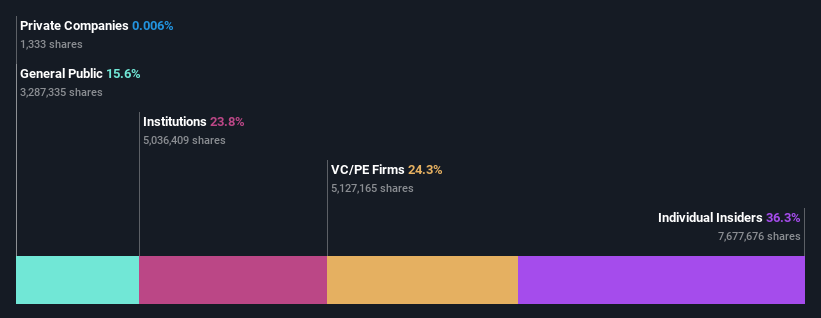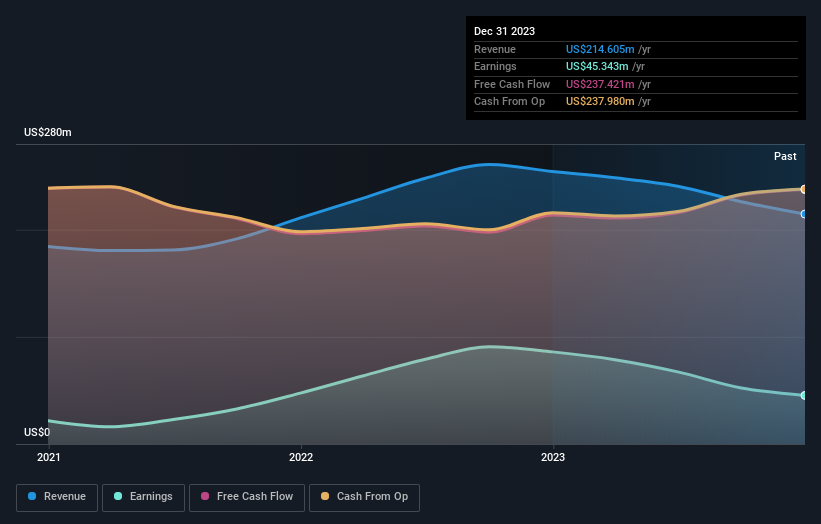Consumer Portfolio Services, Inc. (NASDAQ:CPSS) adds US$18m in market cap and insiders have a 36% stake in that gain
Key Insights
Consumer Portfolio Services' significant insider ownership suggests inherent interests in company's expansion
50% of the business is held by the top 3 shareholders
Institutional ownership in Consumer Portfolio Services is 24%
To get a sense of who is truly in control of Consumer Portfolio Services, Inc. (NASDAQ:CPSS), it is important to understand the ownership structure of the business. The group holding the most number of shares in the company, around 36% to be precise, is individual insiders. That is, the group stands to benefit the most if the stock rises (or lose the most if there is a downturn).
Clearly, insiders benefitted the most after the company's market cap rose by US$18m last week.
In the chart below, we zoom in on the different ownership groups of Consumer Portfolio Services.
Check out our latest analysis for Consumer Portfolio Services
What Does The Institutional Ownership Tell Us About Consumer Portfolio Services?
Many institutions measure their performance against an index that approximates the local market. So they usually pay more attention to companies that are included in major indices.
As you can see, institutional investors have a fair amount of stake in Consumer Portfolio Services. This can indicate that the company has a certain degree of credibility in the investment community. However, it is best to be wary of relying on the supposed validation that comes with institutional investors. They too, get it wrong sometimes. When multiple institutions own a stock, there's always a risk that they are in a 'crowded trade'. When such a trade goes wrong, multiple parties may compete to sell stock fast. This risk is higher in a company without a history of growth. You can see Consumer Portfolio Services' historic earnings and revenue below, but keep in mind there's always more to the story.
Consumer Portfolio Services is not owned by hedge funds. Black Diamond Capital Management, L.L.C. is currently the largest shareholder, with 24% of shares outstanding. With 18% and 7.7% of the shares outstanding respectively, Charles Bradley and Dimensional Fund Advisors LP are the second and third largest shareholders. Charles Bradley, who is the second-largest shareholder, also happens to hold the title of Chief Executive Officer.
After doing some more digging, we found that the top 3 shareholders collectively control more than half of the company's shares, implying that they have considerable power to influence the company's decisions.
Researching institutional ownership is a good way to gauge and filter a stock's expected performance. The same can be achieved by studying analyst sentiments. As far as we can tell there isn't analyst coverage of the company, so it is probably flying under the radar.
Insider Ownership Of Consumer Portfolio Services
While the precise definition of an insider can be subjective, almost everyone considers board members to be insiders. Company management run the business, but the CEO will answer to the board, even if he or she is a member of it.
Insider ownership is positive when it signals leadership are thinking like the true owners of the company. However, high insider ownership can also give immense power to a small group within the company. This can be negative in some circumstances.
Our most recent data indicates that insiders own a reasonable proportion of Consumer Portfolio Services, Inc.. It has a market capitalization of just US$193m, and insiders have US$70m worth of shares in their own names. It is great to see insiders so invested in the business. It might be worth checking if those insiders have been buying recently.
General Public Ownership
The general public-- including retail investors -- own 16% stake in the company, and hence can't easily be ignored. This size of ownership, while considerable, may not be enough to change company policy if the decision is not in sync with other large shareholders.
Private Equity Ownership
With an ownership of 24%, private equity firms are in a position to play a role in shaping corporate strategy with a focus on value creation. Some investors might be encouraged by this, since private equity are sometimes able to encourage strategies that help the market see the value in the company. Alternatively, those holders might be exiting the investment after taking it public.
Next Steps:
I find it very interesting to look at who exactly owns a company. But to truly gain insight, we need to consider other information, too. Case in point: We've spotted 3 warning signs for Consumer Portfolio Services you should be aware of, and 1 of them is a bit unpleasant.
If you would prefer check out another company -- one with potentially superior financials -- then do not miss this free list of interesting companies, backed by strong financial data.
NB: Figures in this article are calculated using data from the last twelve months, which refer to the 12-month period ending on the last date of the month the financial statement is dated. This may not be consistent with full year annual report figures.
Have feedback on this article? Concerned about the content? Get in touch with us directly. Alternatively, email editorial-team (at) simplywallst.com.
This article by Simply Wall St is general in nature. We provide commentary based on historical data and analyst forecasts only using an unbiased methodology and our articles are not intended to be financial advice. It does not constitute a recommendation to buy or sell any stock, and does not take account of your objectives, or your financial situation. We aim to bring you long-term focused analysis driven by fundamental data. Note that our analysis may not factor in the latest price-sensitive company announcements or qualitative material. Simply Wall St has no position in any stocks mentioned.


